The Nissan Pulsar was one of Australia's favourite cars during its heyday through the 1990s, and was even manufactured locally between 1983-93. Australia first saw the Pulsar nameplate attached to the N10 model in 1980 during that awkward phase where Nissan products wore Nissan and Datsun badges at the same time. The N12 generation that replaced it in 1982 started as a Japanese import, but was produced locally from 1983. The 1987 N13 boosted its Australian content by using a Holden-produced engine shared with the Camira, before the 1991 N14 reverted to Nissan mechanicals. The N14 - which included the rally-developed GTI-R that only came to Australia as a grey import - reverted to Japanese manufacture from 1993, which continued with the N15 that arrived in 1995. The 2000 N16 saw hatchback versions sourced from the UK, and both were replaced by the Tiida in 2006. The Pulsar name returned in 2013 with the B17, but sales trickled to halt in 2017 due to competition from the Toyota Corolla and Mazda 3, along with our growing preference for SUVs.

What's on this page
Nissan Pulsar Review, For Sale, Models, Specs & News in Australia
Nissan Pulsar Reviews
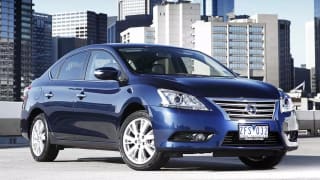
Used Nissan Pulsar review: 2012-2017
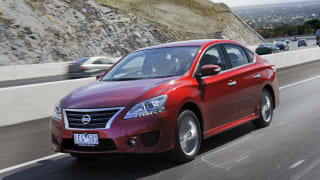
Nissan Pulsar 2015 review
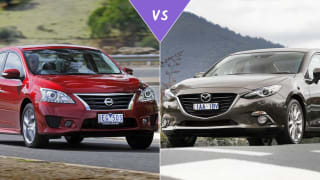
Nissan Pulsar SSS sedan vs Mazda 3 SP25 hatch
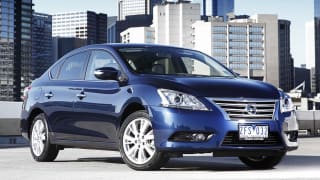
Used Nissan Pulsar review: 2013-2014
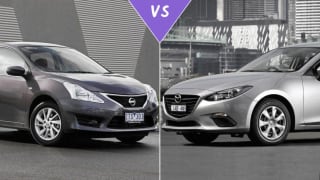
Nissan Pulsar ST vs Mazda 3 Neo

Nissan Pulsar ST-S vs Holden Cruze SRI
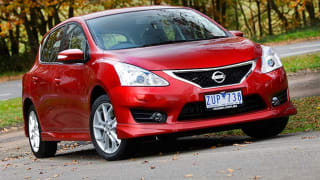
Nissan Pulsar SSS 2013 review
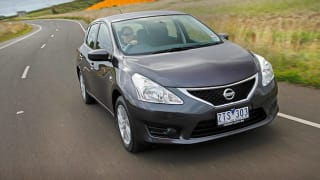
Nissan Pulsar v Ford Focus v Hyundai i30 v Holden Cruze 2013
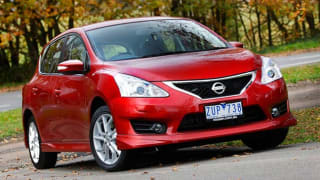
Nissan Pulsar SSS manual 2013 review
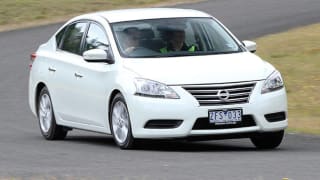
Nissan Pulsar 2013 review
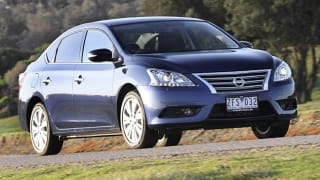
Nissan Pulsar Ti auto 2013 review: snapshot
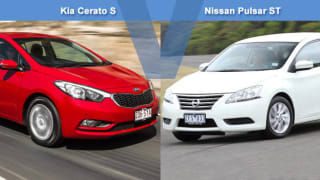
Kia Cerato S vs Nissan Pulsar ST
Nissan Pulsar News

10 long-gone cars, SUVs and utes still sold outside of Australia: Where old favourites such as the Mitsubishi Lancer, Nissan Patrol Safari and Toyota Starlet still exist
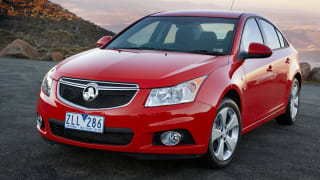
Avoid these second-hand cars! Holden Cruze and Captiva, Nissan Pulsar and more are on our lemons list
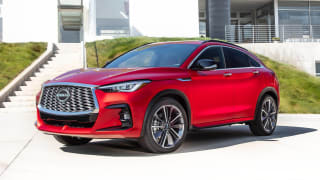
Skyline? Altima? Pulsar? What happened to Nissan's once-popular passenger cars, and will the Japanese giant develop a Toyota Crown-style crossover?
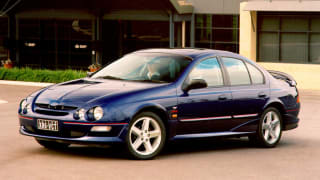
Holden Commodore and Ford Falcon now too expensive? Here are some other collectible Aussie cars that could shoot up in value
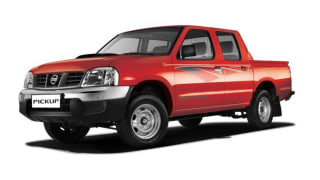
Zombie car apocalypse! How are the 2006 Toyota FJ Cruiser, 1997 Nissan Navara, 1986 Mazda 121 and other cars still in production in 2021, and why?

Where has the sub-$20,000 car gone? Only five new automatic models left as Toyota, Mazda, Hyundai, and Ford abandon budget segment
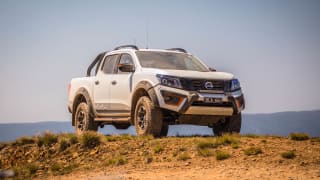
How Nissan can revive its Australian fortunes
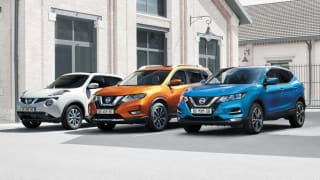
Nissan to cut models amidst falling sales
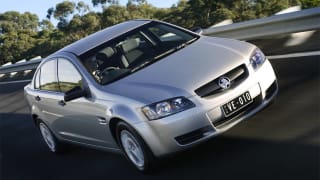
VE Holden Commodore is the most stolen car: report
Nissan Pulsar Q&As
Check out real-world situations relating to the Nissan Pulsar here, particularly what our experts have to say about them.
-
Does the 2016 Nissan Pulsar ST-L manual have an automatic choke?
A modern engine like the one in your Nissan uses electronics to control the ratio of fuel and air, rather than a physical choke like older engines use. However, in order to control this ratio, the modern engine relies on a range of sensors dotted around the car to tell it what’s going on. Examples include a throttle-position sensor, ambient temperature sensor, coolant temperature sensor and many more. If just one of these sensors fails or starts relaying false information, all aspects of the car’s running (including its throttle action) can be compromised.
But before you start scanning the car and spending money to fix the engine flaring during gear changes, take a hard, critical look at what you’re doing with the pedals when shifting gears. If you don’t completely release the accelerator pedal during a gear change, or get your hand-foot co-ordination wrong, the engine will naturally flare during the shift. And because modern cars have a throttle-by-wire system, there’s not the same degree of feel and feedback through the accelerator pedal as some of us are used to. It sounds a bit obvious, but checking your driving style is the first step.
Show more -
Trouble starting my 2013 Nissan Pulsar STS
This sounds a lot like a faulty ignition barrel or an electronic key that has a semi-flat battery. A worn barrel can often prevent the necessary contacts meeting to complete the ignition circuit and, likewise, an electronic key without sufficient power can also give these symptoms as it struggles to enable the ignition. This can be a very hit and miss thing, which is just how you've described it.
So check the condition of the battery inside the key and perhaps the condition of the car's battery as well. If the situation gets worse, a trip to the auto electrician is probably in order. At least your STS model has a relatively conventional ignition key set-up, rather than the push-button, proximity key of the SSS model which brings another layer of complexity to this function.
Show more -
I have a 2003 Nissan pulsar ST. How much is it worth?
Mileage is a very important factor in the retained value of a car like this. The more kilometres it has covered, the less it will be worth. There’s also a sort of kilometre-cliff over which a car will plummet in residual-value terms once it breaches that distance-covered.
Even though you’ve cared for the car and serviced it properly, most buyers will be a bit leery of a car like a Pulsar with so many kilometres on board. Even in otherwise good condition, it would probably struggle to fetch more than about $3000 in the current market.
Show more -
Do you think owners of Nissan CVT cars like the Pulsar should create a class action for all the out of pocket repairs on cars doing less than 100,000 km but more than three years old?
The CVT transmission has haunted many a car-maker over the years and just when another car-makers thinks they’ve got the tech nailed, along comes another series of failures that makes consumers think again.
Late last year in the USA, Nissan paid out a US$277 million settlement for a class action brought by owners of its CVT-equipped cars, so there’s certainly a precedent for this. However, don’t assume that US and Australian consumer law are the same – they’re not. The lawsuit, meantime, accused Nissan of knowing about the fault for years and doing nothing. Nissan, while admitting no wrongdoing, agreed to pay the claims.
The viability or otherwise of a class action legal case is not the sort of advice Carsguide dispenses. You would need to talk with a law firm specialising in this type of litigation and then weigh up the costs and potential benefits, bearing in mind a win is no certainty in these cases.
Show more
Nissan Pulsar Wheel Size
The Nissan Pulsar has a number of different wheel and tyre options. When it comes to tyres, these range from 195x60 R16 for Hatchback in 2018 with a wheel size that spans from 16x6.5 inches.
| Year | Body Type | Front Tyre Size | Front Rim | Rear Tyre Size | Rear Rim | |
|---|---|---|---|---|---|---|
| 2018 | Hatchback | 195x60 R16 | 16x6.5 inches | 195x60 R16 | 16x6.5 inches | |
| 2018 | Sedan | 195x60 R16 | 16x6.5 inches | 195x60 R16 | 16x6.5 inches | |
| 2017 | Hatchback | 195x60 R16 | 16x6.5 inches | 195x60 R16 | 16x6.5 inches | |
| 2017 | Sedan | 195x60 R16 | 16x6.5 inches | 195x60 R16 | 16x6.5 inches | |
| 2016 | Hatchback | 195x60 R16 | 16x6.5 inches | 195x60 R16 | 16x6.5 inches | |
| 2016 | Sedan | 195x60 R16 | 16x6.5 inches | 195x60 R16 | 16x6.5 inches | |
| 2015 | Hatchback | 195x60 R16 | 16x6.5 inches | 195x60 R16 | 16x6.5 inches | |
| 2015 | Sedan | 195x60 R16 | 16x6.5 inches | 195x60 R16 | 16x6.5 inches | |
| 2014 | Hatchback | 195x60 R16 | 16x6.5 inches | 195x60 R16 | 16x6.5 inches | |
| 2014 | Sedan | 195x60 R16 | 16x6.5 inches | 195x60 R16 | 16x6.5 inches | |
Nissan Pulsar Models Price and Specs
The price range for the Nissan Pulsar varies based on the trim level you choose. Starting at $10,120 and going to $21,450 for the latest year the model was manufactured. The model range is available in the following body types starting from the engine/transmission specs shown below.
| Year | Body Type | Specs | Price from | Price to | |
|---|---|---|---|---|---|
| 2018 | Sedan | 1.8L, ULP, 6 SP MAN | $10,120 | $20,350 | |
| 2018 | Hatchback | 1.8L, ULP, 6 SP MAN | $11,000 | $21,450 | |
| 2017 | Sedan | 1.8L, ULP, 6 SP MAN | $9,020 | $18,590 | |
| 2017 | Hatchback | 1.8L, ULP, 6 SP MAN | $10,120 | $19,690 | |
| 2016 | Sedan | 1.8L, ULP, 6 SP MAN | $8,030 | $16,610 | |
| 2016 | Hatchback | 1.8L, ULP, 6 SP MAN | $8,800 | $17,930 | |
| 2015 | Sedan | 1.8L, ULP, 6 SP MAN | $7,920 | $16,610 | |
| 2015 | Hatchback | 1.8L, ULP, 6 SP MAN | $8,250 | $21,560 | |
| 2014 | Hatchback | 1.8L, ULP, 6 SP MAN | $7,150 | $19,030 | |
| 2014 | Sedan | 1.8L, ULP, 6 SP MAN | $7,370 | $13,970 | |
Nissan Pulsar Fuel Consumption
The Nissan Pulsar is available in a number of variants and body types that are powered by ULP and PULP fuel type(s). It has an estimated fuel consumption starting from 7.2L/100km for Hatchback /ULP for the latest year the model was manufactured.
| Year | Body Type | Fuel Consumption* | Engine | Fuel Type | Transmission | |
|---|---|---|---|---|---|---|
| 2018 | Hatchback | 7.2L/100km | 1.8L | ULP | 6 SP MAN | |
| 2018 | Hatchback | 7.7L/100km | 1.6L | PULP | 6 SP MAN | |
| 2018 | Sedan | 7.2L/100km | 1.8L | ULP | 6 SP MAN | |
| 2017 | Hatchback | 7.2L/100km | 1.8L | ULP | 6 SP MAN | |
| 2017 | Hatchback | 7.7L/100km | 1.6L | PULP | 6 SP MAN | |
| 2017 | Sedan | 7.2L/100km | 1.8L | ULP | 6 SP MAN | |
| 2016 | Hatchback | 7.2L/100km | 1.8L | ULP | 6 SP MAN | |
| 2016 | Hatchback | 7.7L/100km | 1.6L | PULP | 6 SP MAN | |
| 2016 | Sedan | 7.2L/100km | 1.8L | ULP | 6 SP MAN | |
| 2015 | Hatchback | 7.2L/100km | 1.8L | ULP | 6 SP MAN | |
| 2015 | Hatchback | 7.7L/100km | 1.6L | PULP | 6 SP MAN | |
| 2015 | Sedan | 7.2L/100km | 1.8L | ULP | 6 SP MAN | |
| 2014 | Hatchback | 7.2L/100km | 1.8L | ULP | 6 SP MAN | |
| 2014 | Hatchback | 7.7L/100km | 1.6L | PULP | 6 SP MAN | |
| 2014 | Sedan | 7.2L/100km | 1.8L | ULP | 6 SP MAN | |
Nissan Pulsar Dimensions
The dimensions of the Nissan Pulsar Sedan and Hatchback vary according to year of manufacture and spec level.
| Year | Body Type | Height x Width x Length | Ground Clearance | |
|---|---|---|---|---|
| 2018 | Sedan | 1520x1760x4610 mm | 160 mm | |
| 2018 | Hatchback | 1520x1760x4295 mm | 137 mm | |
| 2017 | Hatchback | 1520x1760x4295 mm | 137 mm | |
| 2017 | Sedan | 1520x1760x4610 mm | 160 mm | |
| 2016 | Sedan | 1520x1760x4610 mm | 160 mm | |
| 2016 | Hatchback | 1520x1760x4295 mm | 137 mm | |
| 2015 | Hatchback | 1520x1760x4295 mm | 137 mm | |
| 2015 | Sedan | 1520x1760x4610 mm | 160 mm | |
| 2014 | Sedan | 1520x1760x4610 mm | 160 mm | |
| 2014 | Hatchback | 1520x1760x4295 mm | 137 mm | |
Nissan Pulsar Towing Capacity
The Nissan Pulsar has maximum towing capacity of 1200kg for the latest model available.
| Year | Body Type | Braked Capacity from | Braked Capacity to | |
|---|---|---|---|---|
| 2018 | Hatchback | 1100kg | 1200kg | |
| 2018 | Sedan | 1100kg | 1200kg | |
| 2017 | Hatchback | 1100kg | 1200kg | |
| 2017 | Sedan | 1100kg | 1200kg | |
| 2016 | Hatchback | 1100kg | 1200kg | |
| 2016 | Sedan | 1100kg | 1200kg | |
| 2015 | Hatchback | 1100kg | 1200kg | |
| 2015 | Sedan | 1100kg | 1200kg | |
| 2014 | Hatchback | 1100kg | 1200kg | |
| 2014 | Sedan | 1100kg | 1200kg | |

